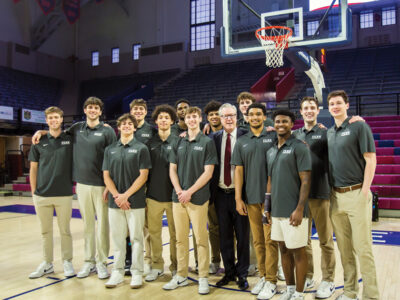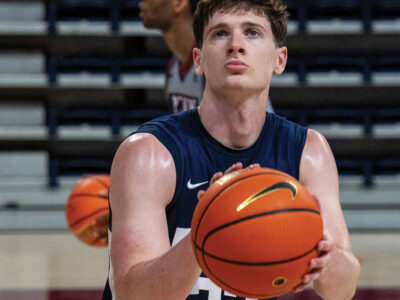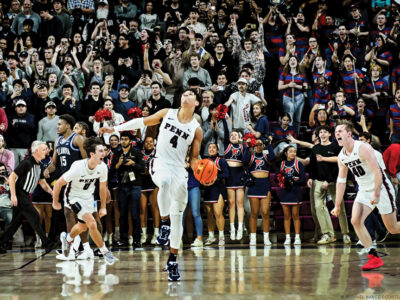By David Porter
The words are incongruous coming from the mouth of a former player whose brilliant career was marked by an almost preternatural calm and poise under pressure. Apparently the coaching profession can jangle the nerves of even the legends among us.
“I’d be lying if I said I wasn’t a little anxious,” Jerome Allen W’09 admitted as he recalled the period leading up to his selection at the end of March as the 18th men’s basketball coach in Penn’s long and illustrious history. “What I tried to do as best as I could was to keep everybody else at peace by staying as calm as possible, and doing the things [athletic director] Steve [Bilsky W’71] asked me to do and control what I could control, which was trying to put a brand of basketball on the floor that people are used to seeing, win or lose.”
There certainly was a lot more losing than winning over the last several months, but the choice of Allen to lead the Quakers out of the doldrums touched off a feel-good moment that rivaled any experienced in West Philadelphia in recent memory. It was as if the 6-22 mark put up by the 2009-2010 squad was a minor footnote to the event, like a drunken wedding crasher who is quickly ushered out the back door.
It was a far cry from the scene at Princeton’s Jadwin Gym on the evening of March 9, the final loss in Penn’s season of ignominy, though one that offered hope for the future in the way the Quakers closed a gaping deficit and nearly stole a game that would have paid back the Tigers for their stunning 1999 comeback at the Palestra.
In the interview room after the game, Allen responded to the obligatory “What will you do now?” question with a flippant response that only reinforced his interim status. Before that, he had made a point to thank the University for the opportunity and wish it all the best in the future.
It had the feel of a self-delivered eulogy, but three weeks later Allen was standing at a podium at the Palestra calling his elevation to full-time status “a dream come true” in a heartfelt speech that must have set records for humility and graciousness.
And suddenly Bilsky looked like a shrewd manager for dumping Glen Miller in December—a rare move in the Ivy League—and giving Allen a chance to sink or swim.
“It’s a lot easier when you can play it out over a couple of months,” Bilsky said, referring not only to Allen’s on-the-job training but to a coaching search that attracted interest from the pro and college ranks. “The Ivy League doesn’t have a conference tournament, and sometimes it’s tough to keep players motivated when you’re out of the race—and probably more difficult for an interim coach. But Jerome did that very well.”
At no time was that more evident than at Princeton on March 9. While the Quakers’ 79-64 win over Ivy League Champion Cornell at the Palestra on February 12 will stand as the season’s signature achievement, the 68-56 loss to the Tigers revealed more about this Penn team and where it may be headed. Down by 39-11 at one point in a first half that looked a varsity-vs.-jayvee scrimmage, the Quakers regrouped at halftime and trimmed the lead to seven points in the final minutes before succumbing.
Afterward, Allen said he was “probably more proud of those guys for that game than I was at any time in the season. They could have packed it in, last game of the year, down 26 at halftime. But they came out in the second half and came together and said, ‘We’re going to play as hard as we can for as long as we can.’ That’s the kind of momentum I was hoping we’d have to carry over into next season.”
Junior Forward Jack Eggleston and sophomore point guard Zack Rosen are the Quakers’ version of fire and ice, and both found cause for optimism beneath the gloom after the loss.
“There were a lot of games where we look back and say we were right there,” Eggleston said. “Both Columbia games, Harvard [a 67-66 loss on March 5]. With the exception of at Cornell [a 68-48 loss on February 27], we were competitive in every Ivy League game, and to look at our record and see 5-9 when we know we were in most of those games is very frustrating. Obviously it’s tough right now, but it’s motivation for the summer to work harder and realize the mistakes we made and the things we need to correct to be successful next year.”
Rosen led the league in scoring and was a unanimous All-Ivy first-team selection—Eggleston made the second team—and seemed to thrive under Allen’s direction.
“Coach Allen talks a lot about embracing the adversity and not getting frustrated but letting this be a part of our testimony when we do what we all know what this team can do,” he said. “It’s going to drive us. All the failures and the close losses this year will drive what we do over the summer and next year.”
Much also will depend on how several players perform after being sidelined with injuries last season. The obvious key is junior Tyler Bernardini, the Ivy League’s rookie of the year as a freshman but a player plagued by injuries for the last two seasons. But add Bernardini to a team that figures to return five of its top six scorers and suddenly the future doesn’t look so bleak.
“I can’t really say we’re going to win the Ivy League or win 20 games,” Allen said from Santa Ana, California, recently as he prepared to hit the recruiting trail, “but I can say we’ll be a better team than we were last year.”
Allen then added a coda that reinforced the view that this is a man who may have found his destiny.
“I get to wake up every day and have the opportunity to help kids get better, give them a sense of purpose,” he said. “I have the greatest job in the world.”
David Porter C’82 writes for the Associated Press.




